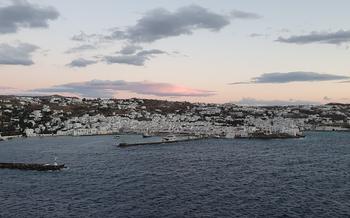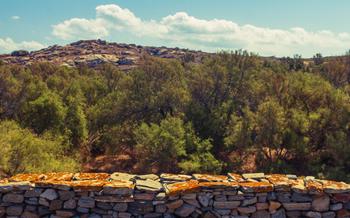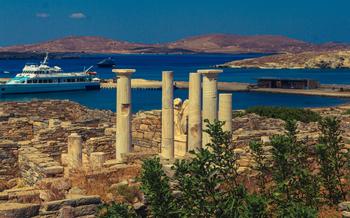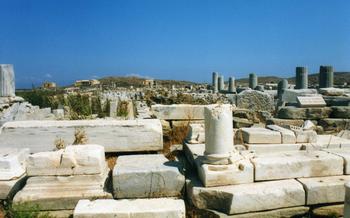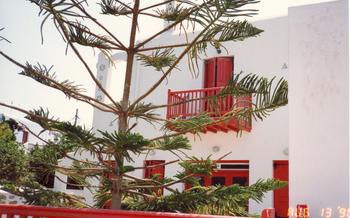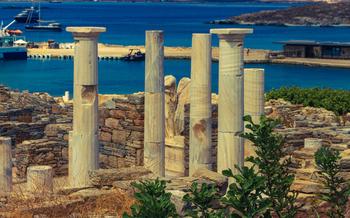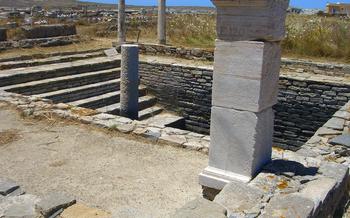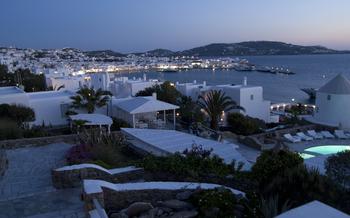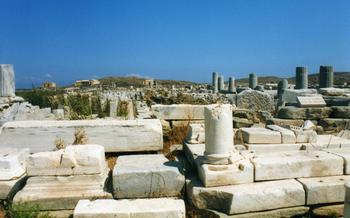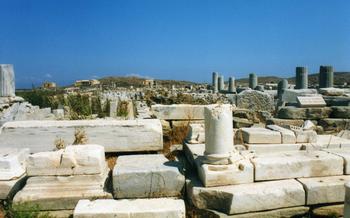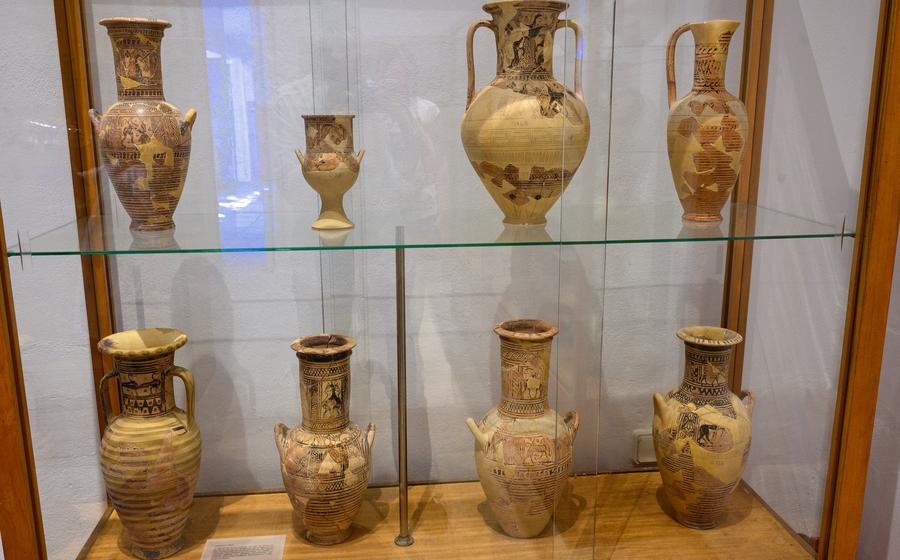
Archaeological Museum of Delos
- Delos, the Sacred Island of Apollo
- Journey to the Past: Exploring the Archaeological Museum of Delos
- Delos's Divine Sanctuaries: A Walk Through History
- Unearthing the Ancient City: Delos's Urban Landscape
- Myths and Legends of Delos: A Realm of Gods and Heroes
- Delos and the Delian League: A Center of Power and Influence
- The Sacred Lake and the Sanctuary of the Bulls
- The House of Cleopatra: A Glimpse into Ancient Luxury
- The Terrace of the Lions: Guardians of Delos
- The Theater of Delos: A Stage for Ancient Performances
- The House of the Dolphins: A Symbol of Wealth and Refinement
- Insider Tip: Plan Your Visit Wisely
Delos, the Sacred Island of Apollo
Delos, a small island in the Cyclades group, holds a significant place in ancient Greek mythology and religion. According to legend, it was the birthplace of the twin gods Apollo and Artemis, children of Zeus and Leto. The island was considered sacred and served as a major religious center in the ancient world.
Delos's archaeological treasures are a testament to its rich past. Excavations have uncovered impressive temples, sanctuaries, and theaters, as well as a vast collection of sculptures, pottery, and other artifacts. These discoveries provide valuable insights into the island's religious significance, its role as a commercial hub, and its vibrant cultural life.
To fully appreciate Delos's wonders, it's recommended to take a day trip from the nearby island of Mykonos. Regular ferry services connect the two islands, making it easy to explore Delos's ancient ruins and immerse yourself in its rich history.
When visiting Delos, it's important to be respectful of the sacred site. Remember to dress appropriately, avoid touching or climbing on the ruins, and dispose of waste responsibly. By following these guidelines, you can contribute to the preservation of this unique and awe-inspiring place.
Journey to the Past: Exploring the Archaeological Museum of Delos
Housed within the walls of the ancient city, the Archaeological Museum of Delos stands as a treasure trove of artifacts that unveil the rich cultural heritage of the island. Its impressive collection, meticulously curated over decades, offers a glimpse into the vibrant past of Delos as a religious and commercial center.
Among the highlights of the museum are exquisite sculptures that once adorned temples and public spaces. These masterpieces, carved from marble and bronze, depict gods, goddesses, and heroes with intricate details and lifelike expressions. Visitors can marvel at the serene beauty of the Winged Victory of Delos, a symbol of the island's sacredness, and admire the intricate craftsmanship of the Naxian Sphinx, a mythical creature with a human head and a lion's body.
The museum also boasts an extensive collection of pottery, ranging from humble household items to elaborately decorated vases. These vessels, used for storage, cooking, and religious rituals, provide insights into the daily lives and customs of Delos's inhabitants. The museum's jewelry collection is equally impressive, showcasing delicate gold and silver pieces that were worn by wealthy individuals as symbols of status and adornment.
Beyond these individual artifacts, the museum's exhibits are arranged in a way that tells the story of Delos's evolution from a sacred sanctuary to a bustling commercial hub. Visitors can trace the island's transformation through maps, models, and interactive displays that bring the ancient city to life. The museum also hosts temporary exhibitions that delve deeper into specific aspects of Delos's history and culture.
Through its comprehensive collection and engaging displays, the Archaeological Museum of Delos offers visitors a profound understanding of the island's significance in ancient Greece. It is a journey through time, where the echoes of the past resonate within the walls of this remarkable museum.
Delos's Divine Sanctuaries: A Walk Through History
Delos, the sacred island of Apollo, was home to a multitude of sanctuaries, each dedicated to a specific deity or group of deities. The most significant of these was the Sanctuary of Apollo, located at the heart of the island. This sacred precinct housed the temple of Apollo, where the god's colossal statue once stood, as well as numerous altars, votive offerings, and other religious structures.
Unearth the secrets of the Sanctuary of Artemis, located on the island's eastern side. Dedicated to the goddess of hunting and childbirth, this sanctuary was adorned with a graceful temple, a sacred grove, and an altar where offerings were made to Artemis. Discover the smaller sanctuaries scattered throughout Delos, each dedicated to a different deity, offering a glimpse into the diverse religious beliefs and practices of the ancient Greeks.
Imagine the sacred rituals and festivals that once took place within these hallowed grounds. The Sanctuary of Apollo was the site of the Delian Festival, one of the most important religious events in the ancient Greek world. During this festival, pilgrims from across the Mediterranean flocked to Delos to honor Apollo and Artemis, participating in processions, sacrifices, and musical performances.
Unearthing the Ancient City: Delos's Urban Landscape
Delve into the well-preserved remains of Delos's ancient city, a testament to the island's former glory as a bustling hub of activity. Explore the Agora, the vibrant marketplace where merchants from across the Mediterranean traded goods, from exotic spices to precious metals. Imagine the bustling atmosphere and the lively haggling that took place within these ancient walls.
Discover the impressive Theater of Delos, a venue for performances and public gatherings. Picture the stage coming alive with comedies, tragedies, and musical concerts, entertaining the diverse population of Delos. Imagine the laughter, applause, and cheers echoing through the theater, creating a sense of community and shared experiences.
Uncover the residential areas, offering a glimpse into the daily lives of Delos's inhabitants. Explore the well-preserved houses, each with its unique architectural features and decorative elements. Discover the stories of the people who once called Delos home, their hopes, dreams, and aspirations.
Delos's urban landscape is a testament to the island's prosperity and cultural significance. As you wander through the ancient city, you'll gain a deeper appreciation for the remarkable achievements of this ancient civilization and the enduring legacy it has left behind.
Myths and Legends of Delos: A Realm of Gods and Heroes
Delos, the sacred island of Apollo, is steeped in captivating myths and legends that have shaped its identity and significance in ancient Greek culture. Discover the enchanting tales of the island's divine inhabitants and the heroes who played pivotal roles in its history.
Unravel the myth of Apollo's and Artemis's birth, as Leto, their mother, sought refuge on Delos to escape the wrath of Hera, Zeus's jealous wife. Explore the stories of Theseus, the legendary hero who slew the fearsome Minotaur in Crete, and Heracles, the mighty son of Zeus, who performed several of his twelve labors on the island.
Delve into the symbolism and deeper meanings embedded within these ancient narratives. Apollo, the god of light, music, and prophecy, represents the triumph of knowledge and order over chaos and darkness. Artemis, the goddess of hunting and childbirth, embodies the wild and untamed aspects of nature. These myths provide a glimpse into the beliefs and values of ancient Greek society.
The myths of Delos continue to resonate today, shaping Greek culture and identity. They remind us of the power of storytelling and the enduring legacy of the ancient world. As you explore Delos's archaeological treasures, let your imagination soar, and immerse yourself in the realm of gods and heroes that once graced this sacred island.
Delos and the Delian League: A Center of Power and Influence
Delos played a pivotal role in the formation and operation of the Delian League, a powerful alliance of Greek city-states established in the 5th century BC to counter the threat of the Persian Empire. The league's treasury was housed on Delos, making the island a significant financial and political center. The league's members contributed funds to a common treasury, which was used to finance military campaigns and other collective endeavors. Delos's strategic location and its reputation as a sacred site made it an ideal choice for the league's headquarters.
The Delian League initially operated under the leadership of Athens, but over time, Athens's influence grew, and the league evolved into an Athenian empire. Delos served as the administrative and financial hub of this empire, and the island's prosperity flourished. However, the league's growing power and Athens's dominance led to resentment among some member states, and the Peloponnesian War erupted in 431 BC, pitting Athens and its allies against Sparta and its allies. The war ended in Athens's defeat, and the Delian League was dissolved.
Delos's fortunes declined following the collapse of the Delian League, but the island retained its importance as a religious center and a commercial hub. The island's sacred sites continued to attract pilgrims from across the Greek world, and its port remained a vital link in the Mediterranean trade network. Delos's legacy as a center of power and influence during the classical period continues to captivate historians and archaeologists to this day.
The Sacred Lake and the Sanctuary of the Bulls
In the heart of Delos, hidden among the ruins of the ancient city, lies a sacred place that once resonated with religious fervor and the veneration of divine beings. The Sacred Lake, a tranquil body of water surrounded by lush vegetation, served as a focal point for rituals and ceremonies honoring the gods of ancient Greece.
At the edge of the lake, discover the Sanctuary of the Bulls, a unique and enigmatic site that has captured the imagination of archaeologists and historians. Here, amidst the remnants of ancient walls and foundations, you will find an extraordinary collection of marble sculptures depicting bulls. These majestic creatures, symbols of strength and virility in ancient Greek culture, were revered as sacred animals and played a central role in the religious practices of Delos.
As you explore the sanctuary, imagine the solemn processions and sacrifices that once took place here. The air would have been filled with the scent of incense and the sounds of prayers and hymns. Devotees would have gathered around the lake, offering libations and performing rituals to honor the gods and seek their favor.
The Sanctuary of the Bulls offers a glimpse into the deep connection between the ancient Greeks and the natural world. The bull, a symbol of fertility and agricultural prosperity, was closely associated with the gods Zeus and Poseidon. By venerating these animals, the people of Delos sought to ensure the continued blessings of the gods and the prosperity of their island.
The House of Cleopatra: A Glimpse into Ancient Luxury
Amidst the ruins of Delos, the House of Cleopatra stands as a testament to the island's opulence and grandeur. Exceptionally well-preserved, this luxurious dwelling offers a glimpse into the lives of wealthy individuals in ancient Greece. As you step inside, intricate mosaics greet you, their vibrant colors still discernible after centuries. The walls are adorned with colorful frescoes, depicting mythological scenes and everyday life. The floors are covered in intricate marble tiles, each piece carefully laid to create a harmonious pattern.
Imagine the owner of this magnificent house, perhaps a wealthy merchant or a high-ranking official, hosting lavish parties and entertaining guests in these opulent surroundings. The house's spacious rooms and elegant furnishings speak of a life of comfort and luxury. The large dining room, with its stunning views of the Aegean Sea, would have been the setting for extravagant feasts, where guests indulged in delicious food and wine while engaging in lively conversations.
The House of Cleopatra is not merely a testament to material wealth but also a showcase of artistic excellence. The intricate mosaics and frescoes are masterpieces of ancient Greek art, demonstrating the skill and creativity of the artisans who created them. These artworks offer a glimpse into the myths and legends that shaped the lives of the ancient Greeks, providing valuable insights into their beliefs and values.
As you explore the House of Cleopatra, let your imagination transport you back in time to the bustling streets of ancient Delos. Imagine the sounds of laughter and music echoing through the rooms, the smell of incense burning in the air, and the feeling of awe and wonder as guests marveled at the beauty and opulence of their surroundings. This remarkable dwelling offers a unique opportunity to connect with the past and experience the grandeur of ancient Greek civilization firsthand.
The Terrace of the Lions: Guardians of Delos
As you wander through the ancient city of Delos, your gaze is drawn to a captivating sight - the Terrace of the Lions. This striking monument features a row of imposing marble lions, each standing guard with unwavering vigilance. These majestic creatures, with their fierce expressions and muscular forms, symbolize strength, power, and protection.
The lions of Delos were meticulously crafted by skilled artisans, showcasing the exceptional artistry and craftsmanship of ancient Greece. Their lifelike features and intricate details, from the flowing manes to the sharp claws, evoke a sense of awe and wonder.
The symbolism of the lions is deeply rooted in ancient Greek culture. They were often associated with the gods, representing their authority and divine power. In particular, the lion was sacred to Apollo, the patron deity of Delos. The presence of these majestic creatures on the terrace served as a reminder of Apollo's dominion over the island.
The placement of the Terrace of the Lions is also significant. Situated prominently along the main thoroughfare leading to the Sanctuary of Apollo, the lions served as guardians of the sacred precinct. They symbolized the protection and reverence accorded to the sanctuary, ensuring that only those who were pure and worthy could enter.
Over the centuries, the Terrace of the Lions has weathered the storms of time, yet its grandeur remains undiminished. The lions stand as silent witnesses to the island's rich history and enduring legacy. Their unwavering presence continues to captivate visitors, inviting them to unravel the mysteries and wonders that lie within the ancient city of Delos.
The Theater of Delos: A Stage for Ancient Performances
Delve into the realm of ancient theatrics as you explore the well-preserved Theater of Delos, a testament to the vibrant cultural life of this sacred island. Originally constructed in the 3rd century BC and later expanded in the Roman period, this impressive venue once hosted a variety of performances, including comedies, tragedies, and musical concerts. Imagine the atmosphere and excitement as the audience gathered to witness these ancient spectacles, captivated by the power of storytelling and the artistry of the performers.
With a seating capacity of over 5,000 spectators, the theater boasts a remarkable state of preservation. Step into the orchestra, the circular performance space, and envision the actors delivering their lines, their voices echoing through the stone tiers. Ascend the stepped seating, marveling at the intricate carvings and inscriptions that adorn the backrest of each seat. The theater's acoustics are equally impressive, ensuring that every word and musical note carried clearly to the furthest corners of the auditorium.
Beyond its function as a venue for entertainment, the Theater of Delos also served as a gathering place for public assemblies and religious ceremonies. During the annual festivals held in honor of Apollo and Artemis, the theater would have been the setting for choral performances, processions, and other rituals. Imagine the vibrant colors and sounds that filled the air as the community came together to celebrate their deities.
The enduring legacy of Greek theater, with its emphasis on storytelling, character development, and dramatic tension, can be traced back to venues like the Theater of Delos. As you sit in the ancient seats, let your imagination transport you back in time, experiencing the thrill and wonder of live performances that shaped the cultural fabric of ancient Greece.
The House of the Dolphins: A Symbol of Wealth and Refinement
Amidst the ruins of Delos, the House of the Dolphins stands as a testament to the island's opulence and grandeur. This exceptionally well-preserved private residence, dating back to the 2nd century BC, offers a glimpse into the lavish lifestyle of wealthy individuals in ancient Greece.
Explore the house's intricate mosaics and frescoes, which depict mythological scenes from the Iliad and Odyssey. Marvel at the vibrant colors and attention to detail, as if the stories of heroes and gods are unfolding before your eyes. Imagine the conversations and laughter that once echoed through these rooms, as guests gathered to celebrate and enjoy the finer things in life.
Discover the stories behind these mythological scenes, delving into the tales of bravery, love, and adventure that captivated ancient Greek audiences. Each mosaic and fresco tells a unique story, offering insights into the beliefs, values, and cultural heritage of this remarkable civilization.
The House of the Dolphins is not just a testament to artistic mastery but also a symbol of the wealth and refinement that permeated Delos during its heyday. As you wander through its rooms, imagine the lavish banquets, the musical performances, and the philosophical discussions that took place within these walls.
Delve into the enduring legacy of Delos's domestic architecture, which influenced the design and construction of private residences throughout the ancient world. The House of the Dolphins stands as a reminder of the sophisticated lifestyle and cultural achievements of this ancient civilization, leaving an indelible mark on the history of architecture and interior design.
Insider Tip: Plan Your Visit Wisely
To make the most of your visit to Delos, careful planning is essential. Timing is crucial, as the island can get crowded during peak tourist season (July-August). Consider visiting during the shoulder seasons (May-June and September-October) to avoid the throngs of tourists and enjoy a more tranquil experience.
Comfortable footwear is a must, as the archaeological site involves a substantial amount of walking on uneven terrain. Sun protection is paramount, so bring a hat, sunscreen, and plenty of water, as there is limited shade on the island.
Guided tours, offered by the museum, provide an excellent opportunity to gain deeper insights into Delos's rich history and significance. These tours are led by knowledgeable guides who can share fascinating stories and anecdotes about the island's past.
By following these simple tips, you can ensure a respectful and enjoyable experience at the sacred site of Delos, creating lasting memories of your journey through this ancient and captivating island.
